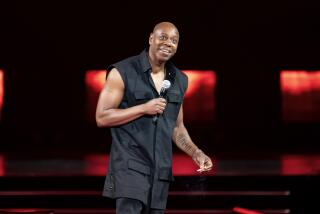A Contender Who Is Real Heavyweight
- Share via
The thing I like about David Bey as a heavyweight contender is not his left hook, although it’s good, or his right cross, although it has KOd 11 guys in 14 fights. It’s his guts.
What I’m trying to say is, there’s a lot of them. Size 38-to-40, I would say at an informed guess.
Bey is a throwback. He is not one of your modern sleek pugs who is built like a triangle or a Greek statue, and has a stomach you could scrub clothes on. Bey has a stomach you could ski down. You look at him and you figure he has just stepped off an old copy of the Police Gazette, one of those turn-of-the-century photos where fighters looked like Irish bartenders with their shirts off and their hair parted in the middle.
You figure John L. Sullivan looked like that before Jim Corbett got through with him and gave portliness a bad name forever.
Bey is just about two eclairs this side of fat. You look at him and you know he never tasted cottage cheese in his life, or drank a cup of coffee that wasn’t two-thirds sugar.
He goes back to a time when fighters were known as The Boston Strong Boy or The Boilermaker, not The Panther or Adonis or The Orchid Man.
On, there have been a couple of pugs whose silhouettes ran to the general lines of Bey’s. There was Johnny Risko, a round man of the late 20’s, a trial horse whose nickname was The Cleveland Rubber Man, perhaps in honor of the way he bounced when he hit the floor.
Then there was Tony Galento, a human keg whose inelegant sobriquet was Two Ton. Tony could fight. He could also bleed. Galento, in mid-fight, looked like the world’s biggest plate of spaghetti. Just the same, he did floor Joe Louis, no less, and turned Freddie Blassie from a fighter to a wrestler.
No one knows yet whether David Bey can fight or just eat. But, like a lot of fighters today, he is starting at the top. He is going to get a shot at the heavyweight championship of parts of the world on March 15 when he takes on Larry Holmes at the Riviera Hotel in Las Vegas. After only 14 pro fights.
Lots of guys make sacrifices to get title shots. They give up families, night life, junk food, girls. David Bey gave up three-quarters of a million dollars.
The circumstances are complicated. In boxing, they usually are.
But, in fine, they went like this: Among the several heavyweight champions of the world, one of the longest lists of impostors this side of a motel registry, was the South African, Gerrie Coetzee. How Coetzee got the title is familiar only to those who know their way through the labyrinth of alphabetical boxing commissions, but suffice it to say that he wanted to defend his title in his native South Africa, a place where he loses with slightly less frequency than he does elsewhere.
The fight was to be held in Bophuthatswana, a kind of fictitious principality like Graustark or Oz, set up by the government of South Africa to transport those parts of the population who louse up the color scheme further south. The presumption is, if they ever discover diamonds or oil there, Bophuthatswana will lose its independent status quicker than you can say Bophuthatswana, but its legal betting casino, eager to distance itself from apartheid, dangles multimillion-dollar appearance offers to draw international attractions.
Bey was internationally attractive largely because it was thought that Coetzee could beat him. You have to search long and hard outside of retirement communities to find individuals who can fill this bill, and the better likelihood is that Bey would rather turn out to be just one more world fighter who could stop Gerrie Coetzee in any country.
But he turned the fight and the $750,000 and, doubtless, the title down. In a burst of ethnic fervor and prompted by Promoter Don King, David spurned the offer and let it be known that, under no circumstances, did he want to lend any credibility or approval to Bophuthatswana. It was not a minor sacrifice. A fighter Bey had beaten in his previous fight, Greg Page, did make the trip, gave Coetzee a bad beating, and came home with the money--and the title.
Still, David’s nobility of sacrifice did not go unrewarded. Larry Holmes, the once and future king of the heavyweights, decided that, out of gratitude for what Bey had done, he would give him a shot at his title, or what’s left of it. Virtue may be its own reward but you can’t eat it. And David Bey likes to eat.
Fighting Larry Holmes is not to be compared to fighting Gerrie Coetzee. Some say Larry signed for the fight after counting up the milkshake bills paid for by the Bey family in the last six months.
But David considers himself svelte compared to his former avoirdupois. When he fought in Germany in the late 70’s, he often climbed into the ring at indeterminate poundage--because the Army scales stopped at 270. His official weight was listed as 272 but observers say that was before he got the left leg up.
Bey doesn’t care. A sunny, carefree character who would never have become a fighter if it weren’t for the fact that the kids in his old Philly neighborhood used to taunt him as a halfbreed--his mother was German and Irish, his father black. He won most of those fights, too, but still might not have been mean enough to become a fistfighter for a living except that the alternative--manning a pile-driver on the Navy Yard docks--was almost as bad as bleeding for a living, and a whole lot less lucrative.
He thinks Larry Holmes is ready to be taken. If so, we can have a heavyweight champ who really is a heavyweight, and we can give the part to Orson Welles if they make it into a movie. It’ll be nice to have a heavy champ who doesn’t look like a young Errol Flynn but an old John L., for a change.
More to Read
Go beyond the scoreboard
Get the latest on L.A.'s teams in the daily Sports Report newsletter.
You may occasionally receive promotional content from the Los Angeles Times.










